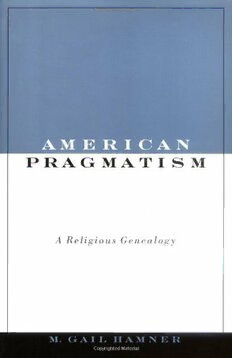
American pragmatism : a religious genealogy PDF
Preview American pragmatism : a religious genealogy
American Pragmatism American Academy of Religion Reection and Theory in the Study of Religion Series Series Editor Mary McClintock Fulkerson, Duke University A Publication Series of The American Academy of Religion and Oxford University Press Working Emptiness Toward a Third Reading of Emptiness in Buddhism and Postmodern Thought Newman Robert Glass Wittgensteinand the Mystical Philosophyas an Ascetic Practice Frederick Sontag An Essay on Theological Method Third Edition Gordon D. Kaufman BetterThan Wine Love,Poetry, and Prayer in the Thought of Franz Rosenzweig Yudit Kornberg Greenberg Healing Deconstruction Postmodern Thought in Buddhism and Christianity Edited by David Loy Rootsof RelationalEthics Responsibility in Origin and Maturity in H. Richard Niebuhr Melvin Keiser Hegel's Speculative Good Friday The Death of God in Philosophical Perspective Deland S. Anderson Newman and Gadamer Toward a Hermeneutics of ReligiousKnowledge Thomas K. Carr God, Philosophy, and Academic Culture A Discussionbetween Scholars in the AAR and APA Edited by William J. Wainwright LivingWords Studies in Dialogues about Religion TerenceJ. Martin Like and Unlike God ReligiousImaginationsin Modern and Contemporary Fiction John Neary Beyond the Necessary God Trinitarian Faithand Philosophyin the Thought of Eberhard Jüngel Paul DeHart Lessing's Philosophy of Religionand the German Enlightenment Toshimasa Yasukata American Pragmatism A ReligiousGenealogy M. Gail Hamner American Pragmatism A Religious Genealogy M. Gail Hamner 2003 198MadisonAvenue,NewYork,NewYork10016 OxfordUniversityPressisadepartmentoftheUniversityofOxford ItfurtherstheUniversity'sobjectiveofexcellenceinresearch,scholarship, andeducationbypublishingworldwidein OxfordNewYork AucklandBangkokBuenosAiresCapeTownChennai Dar esSalaamDelhiHongKongIstanbulKarachiKolkata KualaLumpurMadridMelbourneMexicoCityMumbaiNairobi SãoPauloShanghaiTaipeiTokyoToronto Oxfordisaregisteredtrademark ofOxfordUniversityPress intheUK andincertainothercountries Copyright©2003 byTheAmericanAcademyofReligion Themoralrightsoftheauthorshavebeenasserted DatabaserightOxfordUniversityPress(maker) Allrightsreserved.Nopartofthispublicationmaybereproduced, storedinaretrievalsystem,or transmitted,inanyform orbyanymeans, withoutthepriorpermissioninwriting ofOxfordUniversityPress, oras expresslypermittedbylaw, or under termsagreedwiththeappropriate reprographicsrightsorganization.Enquiriesconcerningreproduction outsidethescopeoftheaboveshouldbesenttotheRightsDepartment, OxfordUniversityPress,attheaddressabove Youmustnotcirculatethisbookinanyotherbindingorcover andyoumustimposethissameconditiononanyacquirer LibraryofCongressCataloging-in-PublicationData Hamner,M.Gail,1963– Americanpragmatism:areligiousgenealogy/ M.GailHamner p.cm.—(TheAmericanAcademyofReligionreflectionandtheoryinthestudyofreligionseries) Includesbibliographicalreferencesandindex. ISBN0-19-515547-5 1.Pragmatism.2. UnitedStates—Religion.I.Title.II.Reflectionandtheoryinthestudyofreligion B832 .H362002 144'.3'0973—dc212002022024 To my parents, William F. Hamner, Jr., and Jane Freeborough Hamner, in love and gratitude This page intentionally left blank Acknowledgments The seeds for this project were sown years ago, when I was a seminary student at Boston University School of Theology. I wish to thank Harold H. Oliver for introducing me to A. N. Whitehead and the Boston personalists, and Robert C. Neville for introducing me to Peirce. Their mentorship and friendship sparked my interest in the connections between “cultural dispositions” and “philosophical formations,” and endeared me to life in the academy despite its many pitfalls and roadblocks. Also from my years at BUSTh, I wish to thank Paul J. Sampleyfor his sharp witand equallysharpcritiques and KatherynPfisterer Darr and JenniferL. Rikefor theircharismaticteaching and for providing needed models of women in the academy. On moving to my doctoral work at Duke University, I was fortunate to find colleagues among both faculty and graduate students. Of the latter, there are not words of thanks enough for Joerg Rieger (now at Perkins School of Theology) and Frank Crouch (now dean of Moravian Seminary). My conversations with Joerg kept me sane and helped me work out a much-needed frameworkfor my doctoral research. Frank and I read through much of Peirce's Collected Papers and secondary Peircean scholarship together, and he read (suffered) through almost all of the early drafts of this work. His comments and suggestions were, and are, invaluable. I also wish to thank Karen Trimble Alliaume, Randall Styers, and Audrey West for theirsupportive friendship and intelligent conversation over the years. Among thefacultyat Duke, I am blessed to haveKennethJ. Surinand Elizabeth A. Clark as my teachers and friends. Their constant encouragement, brutal editing, late night conversations, lessons from the trenches of teaching and scholarship, general availability, and gentle prodding made graduate school a wonderful experience and literally provided the material ground for this book. I continue to be blessed by their loyal friendship. I also wish to thank Judith Farquhar (University of North Carolina, Chapel Hill), Michael viii ACKNOWLEDGMENTS Hardt, Stanley Hauerwas, Bruce Lawrence, Dale Martin (now at Yale University), Tomoko Masuzawa (now at Universityof Minnesota), and Tom Tweed (UNC, Chapel Hill) for time you gave, lines of thought you inspired, and lessonsyoutaughtme,sometimessimplythroughwitnessing youractions.IamalsodeeplygratefultotheDuke-UNC religion and culture reading group, which was begun by Ken Surin and further sponsored and facilitated by Liz Clark andTomokoMasuzawa.Wemetonceamonthfor yearstodiscusshundredsofpagesofcurrenttheory,anthropology, cultural studies, and religious studies; it is an experience I sorely miss. During my three years at Syracuse University, I have been extremely fortunate to have congenial and supportive colleagues. My deepest thanks go to David Miller, Patricia Cox Miller, Richard Pilgrim, and James Wiggens for regularly attending a monthly departmental reading group and standing ready with what seems to me an unending arsenal of encouragement and sound advice. I am grateful to Deborah Pratt and Carol Williams for their smiles and for their efficient and patient administrative assistance. Thanks also to Laura Auerbach, Claudia Klaver, and Monika Wadman for solidarity in our shared task of being a feminist academics and mothers. My thanks and gratitude to the AAR series editor, Mary McClintock Fulkerson at Duke University Press, for her enthusiasm and support of my work, to Stacey Hamilton and Theo Calderara at Oxford University Press for their astuteeditorialadviceand assistance, and totheanonymous reviewers ofmymanuscriptfor theirpertinentand useful comments and criticisms. To Maggie and Michael Bennett, and Al and Jane Boyers: thank you for always being there and for having more confidence in me than I have in myself. And to Dan, Elena, and Seth: without you (your constancy, your clarity, and your love), none of this would matter in the least. I dedicate this book to my parents, in remembrance of my father rockingElenatosleepwhileItypedaway,andofmymothernudgingmeoutthedoor toworkandgivingmeherlabor ofchildcareand cookinginreturn.Bothofyouhaveconsistentlysupportedmylongjourneyfromlaboratorytoivory tower; thank you. Contents Introduction, 3 Prologue The “Puritan”: Mirror of America's Self-Understanding, 10 Part I: Evolution of German Psychology 1. Hermann von Helmholtz, 23 2. Wilhelm Wundt, 40 Part II: Evolution of Scottish Psychology 3. William Hamilton, 59 4. Alexander Bain, 73 Part III: Pragmatic Reception of European Psychology 5. Charles Sanders Peirce, 91 6. William James, 126 Conclusions The Mythology of Self and Nation, 152 Notes, 175 Bibliography, 215 Index, 223
